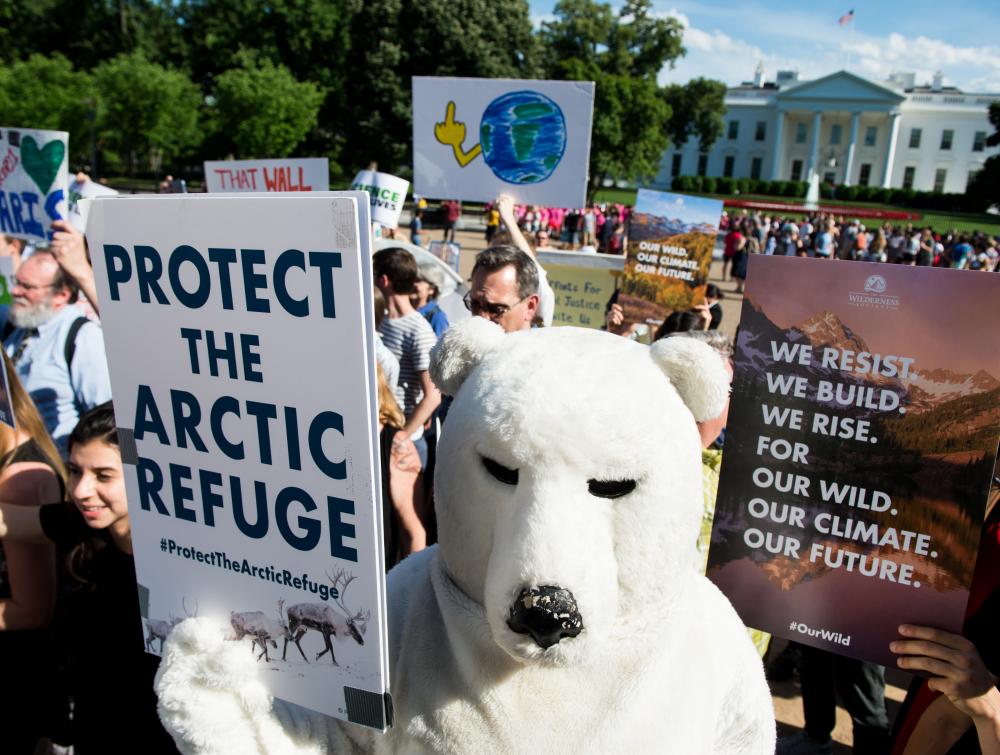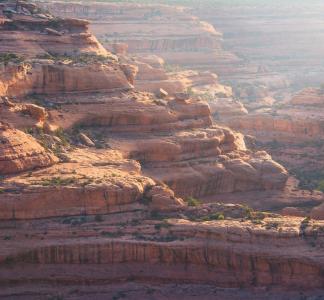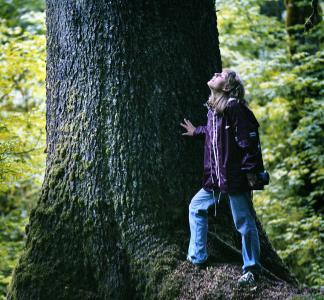2017 in review: Top stories from the war on conservation

Environmental activists protest in front of the White House after President Donald Trump announced he is withdrawing the United States from the Paris climate accord on Thursday, June 1, 2017.
Bill Clark/CQ Roll Call.
2017 kicked off with several big wins
The year 2017 kicked off with several big wins. Among them: President Obama expanding the California Coastal and Cascade-Siskiyou national monuments and declaring three new monuments saluting civil rights history in his final full week in the White House.
But even these victories played out under a pall. The election of Donald Trump to succeed Obama suggested the major conservation achievements of the last eight years would be short-lived. On the campaign trail, Trump had pledged to dismantle environmental protections and prop up fossil fuels without regard for how this would affect our lands and the planet at large. Everything seemed certain to change for the worse on Jan. 20, Inauguration Day.
About a year later, it's safe to say Trump has been waging a war on conservation since before he even took the oath of office—from choosing a cast of climate deniers to steer federal agencies, to repealing protections for sacred Native American cultural sites, to helping his congressional cronies open part of the Arctic National Wildlife Refuge to oil and gas drilling. If you feel like there has been too much bad news to keep up with, you're not alone.
Fortunately, this period of intense threats to conservation has given rise to an equally powerful resistance ethic. With your help, we won a lot of important battles, and even made progress on the wilderness protection front.
This is a non-exhaustive look back at some of the big stories of the year and how we fought back every step of the way.
Trump's cabinet: a coalition of the drilling
 One of the best ways of taking a president-elect's political temperature is by looking at the advisors, transition apparatchiks and cabinet nominees with whom they surround themselves. On this count, Trump may as well have been drafting a fossil fuel fantasy team. Oklahoma Attorney General Scott Pruitt, chosen to lead the Environmental Protection Agency, was an enemy of measures to reduce greenhouse gases and friend to the oil and gas interests he was suddenly being asked to regulate. New secretary of state nominee Rex Tillerson, assigned great influence over America's international climate efforts, formerly led ExxonMobil, which spent decades avoiding action on climate change. Interior nominee Ryan Zinke emphasized energy production on public lands, fearmongered about the mythical "war on coal" and deflected questions about establishing monuments under the Antiquities Act (a sign of trouble ahead). To varying degrees, they and many other members of Trump's incoming cabinet questioned the overwhelming scientific consensus behind climate change.
One of the best ways of taking a president-elect's political temperature is by looking at the advisors, transition apparatchiks and cabinet nominees with whom they surround themselves. On this count, Trump may as well have been drafting a fossil fuel fantasy team. Oklahoma Attorney General Scott Pruitt, chosen to lead the Environmental Protection Agency, was an enemy of measures to reduce greenhouse gases and friend to the oil and gas interests he was suddenly being asked to regulate. New secretary of state nominee Rex Tillerson, assigned great influence over America's international climate efforts, formerly led ExxonMobil, which spent decades avoiding action on climate change. Interior nominee Ryan Zinke emphasized energy production on public lands, fearmongered about the mythical "war on coal" and deflected questions about establishing monuments under the Antiquities Act (a sign of trouble ahead). To varying degrees, they and many other members of Trump's incoming cabinet questioned the overwhelming scientific consensus behind climate change.
OUR REACTION:
We mobilized members to reach out to their senators prior to key cabinet confirmation hearings so we could get potential agency heads on the record about big issues and hold them accountable. Initially, then-nominee Zinke said positive things about keeping public lands in public hands, buoying hopes that we could work with him; but subsequent actions, including his own Interior department's tacit support of some land sell-offs, served notice that this was not so. Later in the year, we rallied businesses and advocacy groups to file a legal petition directing Zinke to develop rules prohibiting the sale or transfer of public lands, so he could make good on his earlier statements. We still await a response.
In the meantime, we continue to watch Zinke and other agency heads closely, trying to move the needle of public opinion to influence them when it's possible and marshaling legal resources to counter them when it's not.
Lawmakers roll back climate and pollution rules
 From the very beginning, Trump has worked with Congress to carry out the bidding of the oil, gas and coal industries that spend hundreds of millions of dollars each year to influence policy-making in Washington, DC. These efforts center on slashing environmental rules and making it easier for special interests to pollute without consequence.
From the very beginning, Trump has worked with Congress to carry out the bidding of the oil, gas and coal industries that spend hundreds of millions of dollars each year to influence policy-making in Washington, DC. These efforts center on slashing environmental rules and making it easier for special interests to pollute without consequence.
In Trump's first few months, this included suspending implementation of the Clean Power Plan, President Obama's signature effort to address climate change; pulling the U.S. out of the Paris climate agreement; repealing a protection for streams that would have forced the coal mining industry to stop dumping toxic coal waste and clean up after themselves; and delaying a rule that seeks to limit methane pollution from oil and gas development on public lands. Broader actions aimed to change the underlying structure of environmental protection, as in the case of a quietly issued secretarial order that radically altered the way federal agencies prepare environmental analyses and disclose their actions to the public.
Through December, Trump has eliminated dozens of environmental rules, and he shows no sign of letting up.
OUR REACTION:
Some of Trump's environmental rollbacks proceeded quickly and without an opportunity for dissent. When possible, we did push back, including successfully advocating for the Senate to vote against a measure that would have repealed a key rule limiting natural gas waste on public lands. Now that the Trump administration has suspended that rule, we have joined tribal groups and others to file a legal challenge.
Of course, few things are as important as mobilizing the grassroots. To that end, we published online activist toolkits to help people and make their voices heard at the local, state and national levels, and helped promote and organize around the People's Climate March in the nation's capital.
Drilling, mining, logging & development poised to invade wildlands
In its single- (and simple-) minded pursuit of so-called "energy dominance," the Trump administration has zealously encouraged drilling and mining, even when it was completely uneconomical. There was no better example of this than Secretary Zinke's decision to lift a several months-old moratorium on new coal leasing on public lands, notwithstanding either the climate change ramifications or the larger market forces that have sent coal into a terminal and irreversible decline. Not long after, President Trump signed an executive order opening most of the Arctic Ocean and some of the Atlantic Ocean for offshore oil drilling.
The theme of selling out our public lands and waters continued with lease sales next to Bears Ears and Dinosaur national monuments and Theodore Roosevelt National Park, as well as a quietly launched effort to open drilling in ocean sanctuaries. The U.S. Department of Agriculture even recommended re-opening more than 1 million acres of land adjacent to the Grand Canyon for uranium mining. In lockstep with such efforts, the House passed a bill to allow controversial mining projects in the watershed of Minnesota's beloved Boundary Waters Canoe Area Wilderness.
Logging was also a priority for Trump and his congressional co-ideologists. The House passed a bill to vastly expand the amount of national forest land that can be logged without public input, and Sen. Lisa Murkowski introduced provisions late in the year that could introduce logging and road-building to nearly 15 million acres of designated "roadless" national forest land while potentially setting a much wider, damaging precedent.
In less direct ways, too, the Trump regime and associates pushed an extractive agenda, deciding to change the landmark (and bipartisan) sage-grouse conservation plans in what Nada Culver, senior director of Agency Policy and Planning at The Wilderness Society, called "a sideways attempt to abandon habitat protection for unfettered oil and gas development."
OUR REACTION:
Throughout 2017, we stumped for the idea that some places simply ought to be off limits to energy development. Our "Too Wild to Drill" report highlighted the last, wildest places under threat from oil, gas and mineral extraction, including the Arctic Refuge and Appalachian Trail. As individual skirmishes popped up, we directed the conversation with lawmakers, asking that they defend the Arctic Refuge, uphold Obama-era oil and gas reforms and push back against bad legislation. We organized a petition to the Interior Department asking that regulations for oil and gas leasing be updated to stop prioritizing drilling over conservation.
As President Trump continues to promise, quite fantastically, that he will bring back coal jobs, we keep elevating local voices who want to move away from dirty coal and its pollution. Our "False Promises" report demonstrated how coal mined on public lands in the West harms communities across the country and why the recent dramatic decrease in demand for coal is unlikely to reverse itself.
Congress votes to open the Arctic Refuge to drilling
The Year of the Drill reached its peak—or, rather, its exploratory well-shaped nadir—in December, when Congress escalated the Trump onslaught with a tax bill that invites oil and gas drilling in the sensitive coastal plain of the Arctic National Wildlife Refuge, one of the last great, intact wild ecosystems on the planet.
It was one of the worst votes on an environmental issue in the history of the U.S. Congress, striking at the heart of a critical haven for dozens of key species, from polar bears and caribou to migratory birds and musk oxen. Experts believe that drilling cannot be conducted in the refuge without harming habitat and undercutting the very purpose of the refuge. This backdoor maneuver flouted decades of bi-partisan support for protecting the Arctic National Wildlife Refuge from oil development.
OUR REACTION:
All year long, we fought tooth and nail to prevent the Arctic Refuge from being opened for drilling. These efforts included publishing a report debunking one of the primary pro-drilling arguments used by oil industry allies, relentlessly lobbing members of Congress to heed public opinion and defend the refuge and launching an advertising campaign to the same end.
Congress ultimately ignored the will of people in opening part of the Arctic Refuge to oil and gas development, but we stand unbowed. We will ensure that no drilling rig ever touches this priceless landscape. As Wilderness Society President Jamie Williams noted, "We and our supporters will fight this in the courts, in Congress, in corporate board rooms, and wherever else the fight takes us."
Bears Ears and other monument lands carved up and disgraced
In April, President Trump showed once and for all that the vaguely pro-public lands statements he and surrogates issued on the campaign trail were a huge fraud. Bowing to anti-conservation members of Congress, he signed an executive order launching a "review" of public lands protected as national monuments under the Antiquities Act, a sweeping action intended to shrink boundaries and open sensitive lands for development. Millions of Americans submitted comments opposing the review and asking that land protections be kept on the books, to no avail. In December, President Trump announced his decision to effectively eliminate Bears Ears and vast portions of Grand Staircase-Escalante national monuments—the prime targets of the review all along--potentially exposing thousands of culturally and ecologically important sites to drilling, mining and visitor misbehavior. Shortly after, Interior Secretary Zinke recommended reduced protections for national monument lands in Oregon and Nevada, along with potentially damaging management changes in Maine, New Mexico and the Atlantic and Pacific oceans.
All told, it was the most extensive rollback of land protections in American history, a stunning rebuke to Theodore Roosevelt, the conservationist president par excellence whose legacy a then newly-elected Trump once promised to honor.
Not to be outdone, fringe members of Congress like Rep. Rob Bishop worked throughout the year to attack the legal basis for protecting places like Bears Ears, moving legislation that would radically cut down the scope of the Antiquities Act and restrict future presidents' ability to safeguard public lands. After Trump's monument decisions, Utah congressmen introduced bills that would both codify them and cut off attempts to fight them in court.
OUR REACTION:
After Trump signed the executive order opening monument lands to "review," we helped elevate the issue and combined with other groups to drive more than 2.8 million public comments to the Department of the Interior, the vast majority opposed to the review. We also partnered with journalist Nate Schweber on the "Dispatches" project to learn how locals really felt about Trump’s rollbacks. Through this project, we were able to expose that local communities were largely against the changes that Trump claimed local people favored.
Finally, in the wake of the Bears Ears and Grand Staircase-Escalante decisions, we filed legal suits against President Trump, boosted by generous support from members. While the fight plays out in court, we are committed to working with partners to monitor the most imminent threats on the ground at national monuments, as well as preparing a response to further monument attacks by the administration and organizing opposition to anti-monument legislation currently in the House of Representatives.
Trump and friends create obstacles to the outdoors
During his confirmation hearing, Secretary Zinke said we need to motivate younger Americans to experience the outdoors and teach them the value of our public lands. He was right. Especially with American children spending less time in nature than ever before, and urban and LGBTQ communities marginalized or forgotten altogether in the "outdoors" discussion, it is vital to embrace an inclusive and equitable vision of advocacy that includes helping more people access public lands, and helping them feel safe and supported while doing so.
We did have one bright spot in this area in 2017: The National Park Service announced it will continue the Obama administration's popular "Every Kid in A Park" program, allowing fourth graders and their families free admission to public lands. Unfortunately, for the most part, the Trump administration has thrown up obstacles. In October, the Interior Department proposed raising entrance fees at 17 national parks, sometimes drastically, even as the Trump administration continues to starve public land agencies. Just recently, the administration decided to eliminate six of the fee-free days it offers for all national parks. Taken together, these indicate a political regime that is, at the very least, uncaring about whether Americans are actually able to enjoy the public lands that belong to them.
OUR REACTION:
We encouraged members to weigh in during the Interior Department's official comment period on national park entrance fees, raising awareness of the Trump administration's nickel-and-dime tactics. Since we can't necessarily bend the federal government to our whim, we also work to affect change at a more local level and shift the larger culture of outdoor access and recreation in a more equitable direction. In Washington state, we helped launch Trailhead Direct, a pioneering program serving Seattle residents who may not have vehicle access to get outdoors. Later in the year, we convened the first ever LGBTQ Outdoors summit, bringing people together from the outdoor industry and conservation community. Moving forward, we are dedicated to making public lands a more inclusive space, and developing the next dynamic generation of conservationists.
Public land takeover movement marches on—but so do we
Over the last few years, the "public land takeover" movement has slithered from scattered state legislatures to the nation's capital. The political aims of this enterprise are to remove places like national forests and wildlife refuges from the protective embrace of federal agencies and give them over to states or private interests. Though the new president and others close to him have offered nebulous criticism of that idea, it was a huge concern entering the Trump era.
Sure enough, shortly after beginning its legislative session, Congress passed a little-known rule authored by Rep. Rob Bishop that will make it easier to sell off national public lands. Days later, fellow Utah Rep. Jason Chaffetz introduced a bill under the framework of that rule that identified 3.3 million acres across 10 states to be 'disposed of' and sold off. Chaffetz was forced to withdraw the proposal after drawing intense criticism, so anti-conservation lawmakers moved on to a different, subtler approach, exemplified by Bishop (yes, again) asking for $50 million in the federal budget to push state seizure of national public lands. Nevada Rep. Mark Amodei and Arizona Sen. Jeff Flake also pushed legislation to sell off national public land, and late in the year, a bill passed out of committee to cut a Massachusetts wildlife refuge by half highlighted a troubling defection by a congressman who ordinarily defends public lands, Rep. Bill Keating. The public land takeover threat is continually mutating.
Contrary to early promises by Secretary Zinke, the Trump administration is coaxing this menace along. Echoing legislation passed by the House earlier in the year, the Department of the Interior is rumored to be planning a "land swap" with a private company that would allow construction of a road through designated wilderness in Alaska’s Izembek National Wildlife Refuge, a shattering blow to decades of precedent.
OUR REACTION:
After the adoption of Rep. Bishop's rule making it easier to sell off national public lands, we encouraged our members to find out how their representatives voted and hold them accountable. This experience came in handy. We next identified the first land-grab attempt quietly executed under Bishop's rule—the bill introduced by Rep. Chaffetz—and amplified it into a galvanizing issue for conservationists nationwide. Under withering criticism, including numerous phone calls from our members and a hostile town hall meeting, Chaffetz withdrew the bill. This would serve as a model to hold leaders accountable for their attacks on Our Wild. Two months later, Chaffetz announced he would not run for reelection.
On the administrative side, we rallied businesses and advocacy groups to file a legal petition directing Secretary Zinke to develop rules prohibiting the sale or transfer of public lands, so he could make good on his earlier statements. We will be monitoring its progress and pressing his office for a response. We will also work to guard Izembek National Wildlife Refuge against a federal land swap that allows an unnecessary road to be built in it, as we have done for decades.
As these attacks played out in 2017, we also raised awareness about the dangers of states seizing public lands, publishing studies showing that lands granted to Idaho, New Mexico and Utah have often been sold off to private interests, including cattle ranchers, oil and gas companies and railroads. Moving into the new year, as public land takeovers take new forms, we will be tracking them every step of the way, fighting them at the state and national level.
Silver linings: Bipartisan hope and wilderness protection
 While 2017 was an incredibly trying year, we were able to work with allies in Washington, DC, and nationwide to get some important things done for conservation, encouraged by a popular movement determined to hold Trump and Congress accountable.
While 2017 was an incredibly trying year, we were able to work with allies in Washington, DC, and nationwide to get some important things done for conservation, encouraged by a popular movement determined to hold Trump and Congress accountable.
Naturally, we were able to rally a lot of opposition to bad proposals, including bringing about the withdrawal of Jason Chaffetz's land takeover bill, defeating a rule rollback that would have undercut efforts to limit methane leaks on public lands and driving millions of comments in opposition to Trump's monument review. We waged (and continue to wage) many legal battles, suing over Trump's monument decisions, his move to open the door for new offshore oil and gas drilling in the Arctic and Atlantic oceans and many, many others.
The conservation community racked up defensive wins on the state and local level as well, including the withdrawal of a bill in New Mexico that would have opened the door to privatizing public lands. In a powerful statement, the Outdoor Retailer show made the decision to leave Utah over the state's anti-public lands policies. Even defeats sometimes offered a hint of solace, as a failed congressional amendment seeking to keep public lands in public hands drew surprising support from both sides of the aisle.
Believe it or not, we also made some legitimate proactive gains for conservation. In the spring, a bipartisan group of lawmakers introduced bills to protect the coastal plain of Alaska’s Arctic National Wildlife Refuge as a designated wilderness area, signaling that despite Congress' later, devastating drilling move, we have the political willpower to keep fighting. Later on, long-awaited bills were introduced to protect approximately 35,000 acres of scenic areas on the California's Central Coast and over 7,000 acres of wilderness in northeast Tennessee. In November, in an unexpected win, Congress passed a bill to protect Texas' Castner Range. Late in the year, the Senate passed a bill establishing two new wilderness areas within New Mexico's Rio Grande del Norte National Monument, setting the stage for a major vote in the House.
In some ways, victories are harder to come by than ever, but that has made our achievements all the sweeter. With your help, we are confident we'll win important battles and stand stronger than ever in defense of public lands in the year ahead.
Breaking: Trump approves shrinking Bears Ears, Grand Staircase-Escalante
Mason Cummings, TWS
Trump invokes Teddy Roosevelt, says he'll protect public lands...then appoints anti-conservation EPA head
Gage Skidmore, flickr
National parks and wildlands are the place for peace & quiet
Lars Lundqvist, Flickr



